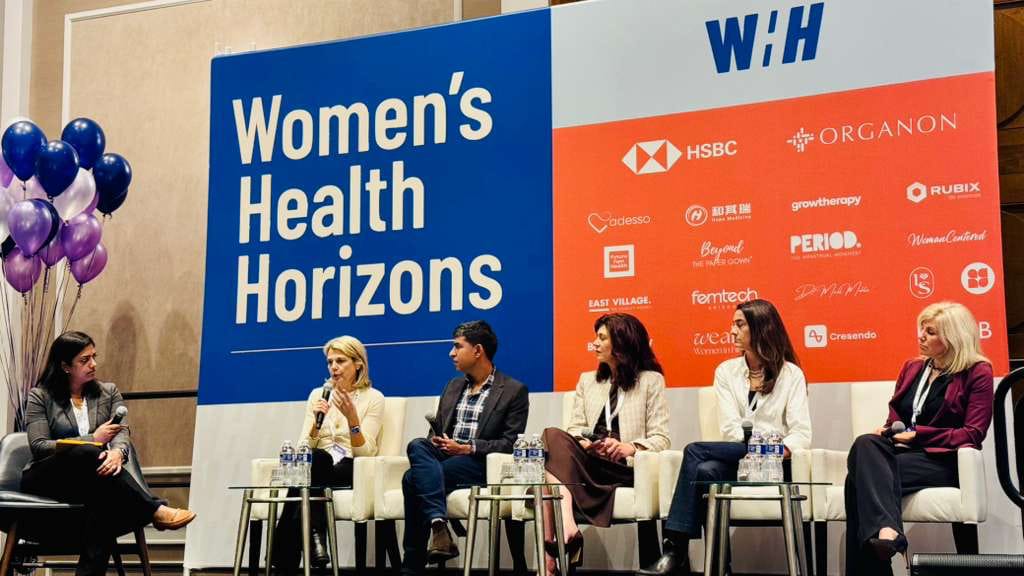- Fempower Health: The Health of Women Playbook
- Posts
- From ADHD to Action: Women’s Health Is Finally Getting Personal
From ADHD to Action: Women’s Health Is Finally Getting Personal
Policy. Advocacy. Mental health. From global change to daily realities, women’s health is evolving—and this week shows how.
Good Morning!
Lots of good things to share this week!
💬 From the opening panel at Women’s Health Horizons 2025, we moved beyond awareness to action—discussing how reimbursement, policy, and advocacy will define the next decade of women’s health.
🌍 The Endometriosis Working Group continues to grow, bringing together global stakeholders from NIH to the World Endometriosis Society to align research, funding, and clinical priorities.
🧠 Our feature dives into ADHD in women—why it’s been overlooked for decades, how it really shows up, and what happens when mental health is treated as an essential part of women’s health.
📅 Plus, three events to bookmark: Women’s Health Advocacy NYC Event, Springboard Enterprises’ 25th Anniversary Gala and the Milken Institute Future of Health Summit.
And in this week’s quick reads: a new miscarriage discovery, a breakthrough on menopause and mental health, and one very brave woman running barefoot on LEGO®.
🙌🏼 Before you scroll: If you enjoy this newsletter, please support by subscribing on on YouTube.
Let’s get into it.
SPOTLIGHT
The Future of Women’s Health: From Awareness to Action
For years, conferences on women’s health have focused on raising awareness of the data gaps, the lack of research funding, and the disparities that impact care. We all know the numbers by now. What’s encouraging is that the conversation is starting to evolve.
At last week’s Women’s Health Horizons conference in Boston, I joined the opening panel alongside Dr. Neel Shah (Maven Clinic), Rachel Butler (Catalytic Impact Foundation), Lisa Marceau (Alpha Millennial Health), and Dr. Jenny Carillo (VC & Advisor), moderated by Vasanta Pundarika (Lotuspring). Our discussion focused not on what’s broken, but on how to fix it. We talked about the dynamics of the healthcare system — reimbursement, policy, and the realities that shape access and innovation. We also addressed conditions like endometriosis and fibroids, and the ways these conditions expose how fragmented women’s health care still is.
Advocacy came up often — and not just in the abstract sense. We spoke about what real action looks like: lobbying, policy change, and coordinated campaigns that drive measurable progress. These are the conversations that signal real momentum.
Quick Update
Many of you may remember when I first shared news of the Endometriosis Working Group, a global effort to align researchers, clinicians, economists, and policymakers to identify and close the gaps in how endo is diagnosed and treated. That work continues. In recent months, I’ve met with the NIH, the World Endometriosis Society, and other leaders across the ecosystem. It’s been encouraging to see both state-level initiatives and global efforts gaining traction.
Endometriosis is finally being discussed not as an isolated issue but as a systems problem — one that intersects with research, reimbursement, and policy. And that’s exactly where progress starts.
Stay tuned for updates. If you haven’t yet shared your work in endometriosis, I invite you to complete the brief survey. Insights will be included in the Endometriosis Pulse Brief.
EDUCATION
High Functioning or Hiding?
For decades, ADHD was seen as something that mostly affected boys.
Girls who struggled to focus, organize, or manage emotions were told they were anxious, lazy, or too sensitive.
Today, research tells a different story: ADHD is just as common in women as it is in men. The difference? We weren’t looking for it.
Why So Many Women Were Missed
Most girls show the inattentive type of ADHD — zoning out, overthinking, or quietly struggling — rather than the hyperactivity that teachers and parents expect to see. As adults, those same women often mask their symptoms by overachieving, overcommitting, and running on empty.
It’s why so many describe themselves as “high functioning but exhausted.”
How It Shows Up
ADHD in women can look like:
Chronic overwhelm
Emotional intensity or sensitivity
Trouble finishing tasks that “should be simple”
Perfectionism or people-pleasing to stay in control
Nights spent catching up after masking all day
And because ADHD so often overlaps with anxiety, depression, or sleep issues, it’s easy to treat the symptoms without naming the cause.
Why This Matters
When ADHD is undiagnosed, it chips away at confidence and well-being.
It affects relationships, parenting, work performance, and self-image — and it’s another example of how women’s health is shaped by outdated assumptions.
Awareness isn’t just about diagnosis. It’s about understanding ourselves differently — and treating our mental health as an essential part of women’s health.
For a Deeper Dive
If this resonates, you’ll want to listen to these Fempower Health episodes that unpack ADHD through the lens of women’s health and lived experience:
ADHD and Family Dynamics: https://youtu.be/y5_bu-oTAIY
ADHD in Women: https://youtu.be/PCvRCYsglks
Source: Children and Adults with Attention-Deficit/Hyperactivity Disorder (CHADD)
EVENTS
NYC Women's Health Policy Forum
Thursday, October 30 • 9:00 AM • New York, New York (Register to See Address)
Cure and Women's Health Advocates are teaming up to provide in-depth analysis on women's health policy, what is happening in D.C. impacting the health of women, and what we can do to shape the process from experts who have spent decades working in and with government.
Register to attend and please share with your network.
Springboard Enterprises 25th Anniversary Gala
Tuesday, October 28, 2025 • 6:00 PM • Nasdaq MarketSite, New York City
Join Springboard Enterprises to celebrate 25 years of advancing women entrepreneurs. Since its founding, Springboard has accelerated more than 940 women-led companies, celebrated 240 exits and 28 IPOs, and generated $76B in global market value.
This milestone event will bring together more than 250 founders, investors, thought leaders, and innovators — honoring the women and supporters who made this success possible and launching the next chapter under new leadership.
Milken Institute Future of Health Summit 2025
November 4–6, 2025 • Salamander Washington DC
The Milken Institute’s Future of Health Summit convenes global leaders to confront the toughest challenges in health — matching human, financial, and scientific resources with the most innovative ideas to drive better outcomes for every community.
Topics include women’s health, biomedical innovation, chronic disease prevention, mental health, longevity, rare diseases, and food as medicine. The summit amplifies innovative partnerships, targeted research, and policy priorities shaping the future of care.
ROUNDUP
What Caught My Eye
📚 All the Cool Girls Get Fired
Getting fired isn’t failure—it’s transformation. In this unapologetic guide, Laura Brown and Kristina O’Neill turn career loss into your ultimate comeback playbook, with humor, candor, and advice from women who’ve been there.
👉 Pre-order the book
🧬 Hidden Cause of Miscarriage Identified
Researchers at Tommy’s National Centre for Miscarriage Research have discovered a womb-lining issue that may explain recurrent miscarriages—offering new hope for prevention and treatment.
👉 Read the study
🧠 Menopause & Mental Health: A Breakthrough Study
For the first time, scientists have mapped cellular and molecular brain changes across the menopause transition—shedding light on the biology behind mood shifts and cognitive changes.
👉 Learn more
💸 Why Women’s Health Startups Struggle to Survive
Stat News examines the systemic barriers that keep innovative women’s health companies from thriving—revealing how funding models, bias, and broken incentives crush progress.
👉 Read the article
😂 Fastest 100m Barefoot on LEGO® Bricks?!
Gabrielle Wall of New Zealand ran 100 m barefoot over LEGO® bricks in 24.75 seconds—and somehow survived to tell the tale. Proof that women truly can do anything.
👉 Watch the clip
👉 Have something for me to share with this group? Reply to this email. 🙏🏼
💪 Fempower Health Resources
Check out Fempower Health’s health topics. Interested in the podcast? Subscribe to the podcast on Apple, Spotify, Amazon Music, and YouTube.
🤝 Stay Connected
If you spot important women’s health updates, please:
✔️ Reply to this email
✔️ Tag Fempower Health or Georgie Kovacs on social media
Your insights and experiences help build a stronger, more informed community. Thank you for being here.
– Georgie
The information shared by Fempower Health is not medical advice but for informational purposes to enable you to have more effective conversations with your doctor. Always talk to your doctor before making health-related decisions. Additionally, the views expressed by the Fempower Health podcast guests are their own and their appearance on the program does not imply an endorsement of them or any entity they represent.
Some of the links in this newsletter are affiliate links, which means I may earn a small commission if you make a purchase through them—at no additional cost to you. I only recommend products or services I truly believe in. Your support helps keep this newsletter going!



Reply